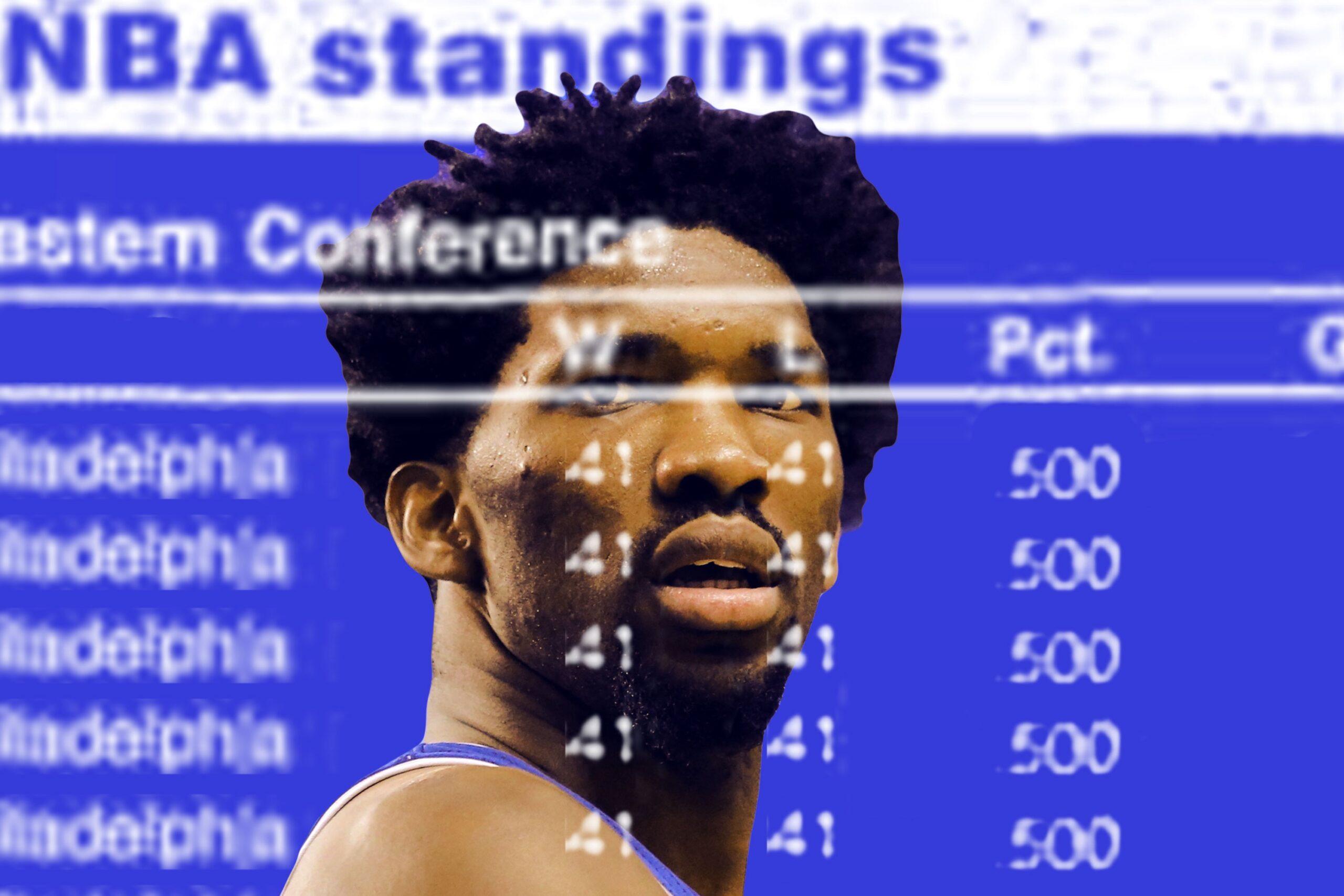
This is what the treadmill of mediocrity looks like.
It was the 2012 Eastern Conference semifinals, Game 4, in Philadelphia. Doug Collins’s scrappy, upstart Sixers vs. Doc Rivers’s scrappy, rusting (but still dangerous) Celtics. Philly, a big underdog, even against this late-model Ubuntu team, was going punch-for-punch with Boston in the series. And in Game 4, they staged a second-half comeback to win the game 92–83, evening things at 2–2.
We talk a lot about team-building, and franchises looking for an edge wherever they can find it. Love was Collins’s market inefficiency. He loved his players, he loved Dre, he loved Jrue, he loved Evan sometimes (though he would have preferred he were Derrick Favors), he loved Thad, and he loved Lou. He loved the franchise, he loved the city, and he loved the fans. He cried and he frowned and he hugged and he hurt. It was disarming. It was the loophole he exploited to drive his team beyond the expected results. It pushed them to a 35–31 record in the lockout-shortened season, and the eighth seed in the Eastern Conference playoffs.
No Sixers player in Game 4 had more than 16 points, the team took 11 3-point shots (lol), Turner (who, by the way, still isn’t DeMarcus Cousins, Gordon Hayward, or Paul George) did not look like a no. 2 draft pick, and Lavoy Allen played almost 33 minutes. This team was not going anywhere. I knew that, on some subconscious level. I knew that the only reason they had gotten past Tom Thibodeau’s Bulls in the first round was because Derrick Rose’s knee exploded. The only reason they hadn’t been swept by the Celtics was because the Celtics did not give a shit anymore.
And when Iggy’s 3 went down, the roof came off.
The Sixers would lose the series in seven games. I had to look that up. I was surprised by some of the names on the roster. The details are fuzzy, but the feeling in the Whatever Bank Was Sponsoring It At the Time Center Arena? I remember that like it was yesterday. You watch hours and hours of sports for a moment like that, and when it comes you don’t modulate your reaction because of the franchise’s blueprint.
A year later Jrue Holiday was traded to New Orleans for Nerlens Noel and a first-round pick (that would eventually become Dario Saric). Collins stepped down at the end of the 2012–13 season, Sam Hinkie fully took over the team, and the rest is the Process.
Fast-forward to the summer of 2017 (skipping past those 253 losses over the last four seasons). Bryan Colangelo has it all — he orchestrated a predraft deal with Danny Ainge to secure Markelle Fultz, and ushered in the arrival of two wise men, in veterans Amir Johnson and J.J. Redick. If everyone’s navicular bones and meniscuses check out, the Sixers’ 2017–18 opening-night lineup will feature two no. 1 draft picks and another guy who, when healthy, plays like one. They have one of the best shooters in the history of the game lining up at shooting guard, and a legitimate, NBA-level 10-man rotation that mixes veteran savvy with untapped upside. They are, like, an actual NBA team, for the first time in years. Now comes the hard part.

The central argument at the heart of the Process is whether or not moments like Iguodala’s 3 against Boston are enough. This is how people reacted inside of Wells Fargo when the ball went through the net:
I was there. It felt pretty great. It was a small victory, but that’s what sports fandom is made of. Eight teams have won the NBA championship this century. So there are a lot of those small victories to go around — Iguodala hitting a 3 in the middle of a conference semifinals, John Wall leaping onto a scorer’s table against Boston in 2017 (in a series the Wizards would go on to lose), Damian Lillard crushing the Rockets in the first round in 2014, Kevin Garnett getting 32 and 21 against Chris Webber to send the Wolves into the Lakers’ slaughterhouse, a.k.a. the 2004 Western Conference finals.
Jumping on the scorer’s table in the conference semis is the best. Is it as good as a parade and confetti and crying over the Larry O’Brien Trophy? No. But for a long time, if given the choice between trophies or nothing, I was happy with the scorer’s table, and I think a lot of people — fans of the 22 teams that haven’t won a title since 2000 — would agree with me. Or at least they would have.

One of the biggest things to happen to the NBA this decade is the abandonment of the present. This has gone hand in hand with the rise of basketball social media as a (not entirely reliable) narrator of the league, and events that are seemingly calibrated to stir that cauldron (The Decision and all the baby decisions it birthed).
A player like LeBron James and a team like the Warriors asks us to look outside of the moment, I guess. They force us to think about legacies, about how history will remember them, and at the same time they demand that we think five years into the future. They point to a seemingly insurmountable summit. It’s brilliant to witness, but it ruins the curve for the rest of the class.
Sam Hinkie said "challenge accepted." He said small victories are not enough, and if you want to have a parade, love and Andre Iguodala are not enough. So a capped-out Sixers team that was paying Elton Brand $16 million tanked its way to multiple lottery picks, hoping at least one hit the jackpot. They didn’t saddle themselves with expensive veterans in order to stay respectable. They didn’t delude themselves into thinking Iguodala was a franchise player. They did a hell of a lot of losing in order to put themselves in a position to do a whole lot of winning. Some people thought he was a genius, some thought he was making a mockery of the league. Time and Bryan Colangelo will prove whether Sam Hinkie was right or wrong.
As a Sixers fan, I hope that Ben Simmons, Fultz, and Joel Embiid are the SoundCloud version of Harden, Westbrook, and Durant, except, you know, we keep them together and roll down Broad Street multiple times. But as an NBA fanatic, and an appreciator of small victories, I’m worried that the former is becoming a zero-sum game, and the latter is going to go extinct.
Utah just lost its franchise player. Dallas can’t get anyone to walk Dirk to the retirement home. Portland is good but not great; Toronto is great during the regular season and good during the playoffs, which is ultimately bad. There are already rumors about teams trying to pry Giannis Antetokounmpo from Milwaukee, and we’re already making preparations for Anthony Davis and DeMarcus Cousins’s exit from New Orleans. The Thunder are a six- to 12-month experiment, LeBron could exit Cleveland next summer, leaving the team as it was before he returned. John Wall hasn’t signed his max contract from Washington; James and Wall share an agent. The Kings, Nets, Hawks, and Magic are in various stages of tanking and rebuilding. The Knicks, Bulls, Pacers, and Clippers are trying to stay relevant.
Only five teams can look themselves in the mirror and say that the Finals are a realistic goal. Two can do it without blinking. Somehow, we’ve arrived at a place where going 51–31 and losing in the second round is cause for a teardown. The internet destroyed local fandom — Wizards fans know what Masai Ujiri and Daryl Morey are doing in their offices, and what Brad Stevens is doing on his bench, and what kind of cap room Pat Riley is playing with next summer. Such is our disdain for competence, for OK, for actually not bad that we are more enamored with a Phoenix roster, half of which is made up of people who can’t legally buy a beer, than we are a Wizards team that features one of the best backcourts in basketball — a Wizards team that will be screwed if it chooses to keep its third-best player. The Wizards will be handcuffed to the treadmill for the foreseeable future. And in the NBA, that’s a bigger crime than losing.
Ironically, that’s where the Sixers are going to be this season. While they wait for Fultz to realize that this is not an appropriate pregame meal, and for Embiid to be able to play more than 40 games, and for Simmons to "fix" his jumper (or start shooting it with the correct hand, if you ask Kevin O’Connor), and for Jah Okafor to get traded for cash considerations, there will be some winning, and some losing, and some good nights and bad. The Process has brought Philadelphia back to the party, but the Sixers are still at the back of the buffet line. As a fan, I am ecstatic at the potential, but if I am being completely honest, I am just as excited to witness another few small victories: Allen Iverson stepping over Ty Lue, Iggy’s 3, a January T.J. McConnell game winner over the Knicks …
It’s important to have fun, even if you’re walking in place.
An earlier version of this piece incorrectly stated that Sam Hinkie traded for Andrew Bynum; the Bynum trade happened before Hinkie joined the team.

